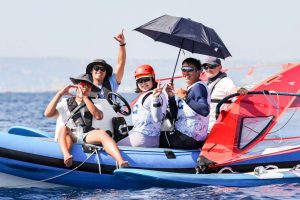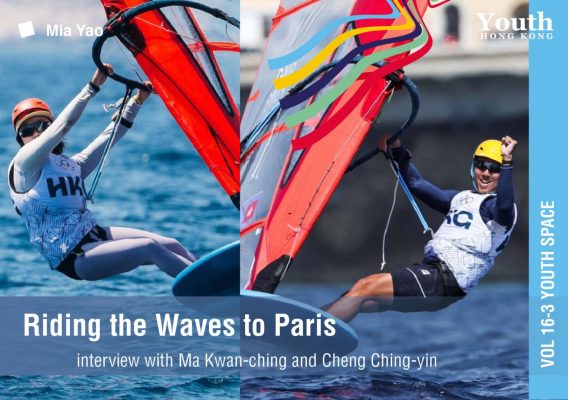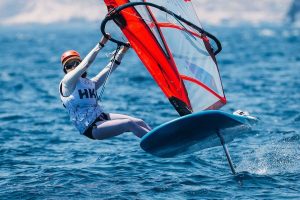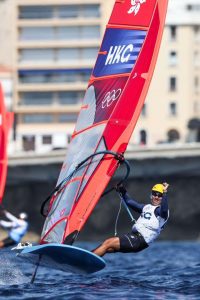Riding the Waves to Paris: Stories of Two First-time Olympians
//16.3 Youth Space: Sports
Riding the Waves to Paris
by Mia Yao
First-time Olympians Ma Kwan-ching and Cheng Ching-yin share their Olympic journeys and dreams.
Competing in the Olympics with the world’s best athletes might be a dream for many, but for Ma Kwan-ching and Cheng Ching-yin, it means more than childhood dreams coming true. The Olympics became a beacon of light to guide them through challenging times.
The atmosphere in Marseille, where the windsurfing events took place, was deeply moving to the two young windsurfers. “It was so uplifting to see so many supporters from Hong Kong. They weren’t just our friends or family, but other people we hadn’t met before,” said Ma. “I have never experienced anything like that in my life.”
Recalling the atmosphere, Cheng said: “We could see Hong Kong flags at the starting point, and that was very comforting. We knew how well-prepared every athlete was, but we could also see how nervous they all were. Just like us. So, I tried hard to imagine myself at a normal competition and just enjoy the journey.”
Before Paris, Ma won a silver medal in the women’s iQFoil category at the Hangzhou Asian Games, which solidified her status as the top Asian qualifier for Paris. Cheng won a bronze medal in the men’s iQFoil category at the 2023 Asian Games and secured his Olympic spot.
Riding the Tides
Hong Kong has a long history of competing in Olympic windsurfing, with its crowning glory coming in 1996, as Lee Lai-shan won the city’s first Olympic gold medal in the women’s mistral individual event at the Atlanta Games. It was this historic achievement that inspired Ma to take up windsurfing and try to emulate her hero.
Both Ma and Cheng began windsurfing at a young age. Growing up near the sea, they had the opportunity to develop their interests in water sports, before later turning it into a professional passion.
Cheng used to be a swimmer and took up windsurfing as a hobby when he was 11. “I didn’t find swimming particularly fun. All I could do was look at the bottom of the pool while swimming. But windsurfing is different. I can explore the environment, observe and enjoy my surroundings. I am sure this is something I will do even when I retire from my sporting career.”
In fact, they both alluded to the fact that unlike other sports, such as running and swimming, for example, where performance is easily measured by numbers, windsurfing depends heavily on external factors, like the weather and the sea conditions, requiring the participants to be agile, both physically and mentally, and ready to adapt at any given moment.
“There were times when I didn’t perform very well. I felt lost and questioned whether I’d made the right decision,” Cheng admitted. He recollected how in 2023, he struggled to make breakthroughs in competitions and training. Ma too has faced similar challenges, most particularly in 2018, when she considered giving up windsurfing altogether.
Yet, neither walked away, and instead persisted and worked hard to represent the Hong Kong team in the 2024 Olympic Games.
“My dad told me that quitting is easy, but persevering with what you’re doing is the greatest challenge in life. We often feel like we’ve lost control of things, just as we can’t control the weather and waves when windsurfing. The most crucial thing is that we keep learning from our environment, and the highs and lows of life,” Ma had said in another interview.
Whenever life feels stuck, the two Olympians have their tips and philosophies to get them through the challenges. Ma believes that “when life is not going smoothly, we must believe that if a door is closed for you, another will open. We need to have confidence in ourselves.” Cheng too emphasises the importance of a positive mindset. “It’s fascinating to see how situations tend to improve when you maintain a positive outlook,” he said.
Lighting the Way to Paris
For Ma, the Olympic dream began when she was seven years old. “Known as ‘Big Head Girl’ I had poor hand-eye coordination and no athletic talent. I knew that if I wanted to become an athlete, I would have to make great efforts.” To gain an edge in the Paris iQFOiL race, a new Olympic windsurfing class, Ma had put on over 10 kg in weight to enhance her stability. Cheng too has faced many twists on his way to Paris, especially after having failed to qualify for the Tokyo Games.
Despite all their hard work and persistent efforts, the results did not turn out as they would have wished. Cheng came in 13th, and Ma 14th, with neither advancing to the medal races.
Although disappointed, Ma was encouraged by her improved performance in the marathon endurance race, which has boosted her confidence for future competitions. “It felt like a rollercoaster. Things didn’t go as expected, but I believe I gave it my best,” she told reporters after the event.
For Ma and Cheng, the Olympics was their lighthouse, something to aim for. But it is not just about winning medals. Instead, it is about having a goal, pursuing it, and getting better every step of the way. “The Olympics was my goal to aim for, irrespective of the result,” Ma said. Cheng concurred, adding: “There are always more people losing than winning. You learn from failure and improve. Not just in sports, but in life.”
So, what’s next after the Olympics? Both of them are preparing for the 15th National Games to be held in Guangdong, Hong Kong and Macao, followed by the Asian Games, and then, the 2028 Olympics in Los Angeles.

Ma Kwan-ching and Cheng Ching-yin, two windsurfers from Hong Kong, made their Olympic debuts at the Paris 2024 Games.
Passing the Torch
Ma puts her successes down to her coach who helped her regain her confidence after an accident that required stitches. “He held my hand and helped me swim back to the sea, and told me not to be afraid of the strong winds and waves.” She believes that with proper training and good risk management, facing the waves can help young people face their fears to overcome life’s storms.
Cheng hopes that young people find passion in whatever career they choose. “I hope we can inspire the younger generation – seniors and juniors alike – to pursue what they love, find joy in whatever they do, shine brightly, and reach their full potential.”
Words to live by as they reflect on their Olympic takeaways: be calm; don’t self-inflict pressure; don’t give up if the results are not good; and always enjoy each moment and water sports.
In the long run, Ma hopes to promote water sports not as extreme sports, but as a means to “learn about the sea and coexist peacefully with nature, while challenging the waves with humility and respect.” ■




